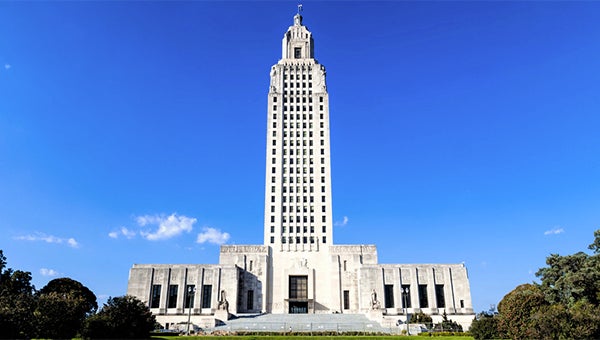Council discusses sales tax proposal
Published 12:47 am Wednesday, March 13, 2013
Facing increased opposition, Washington Parish officials brought their case for a proposed sales tax increase to the people Monday night during a meeting of the Parish Council.
Finance director Donna Alonzo, backed by Parish President Richard Thomas, presented a grim financial picture of the parish’s current financial state. If the proposed .33-cent increase, which goes before the voters April 6, fails, Alonzo admitted the parish would have to take dramatic measures to make ends meet.
“We cannot spend money we do not have,” Alonzo said. “Services will have to be cut. Our revenues have not met our expenses.”
The crisis has been building for the past several years, and in 2010 the parish had to transfer $900,000 from reserve funds to balance the budget.
Parish officials struggled to balance the 2012 budget and are projecting a $450,000 deficit to the general fund in 2013, despite a 16 percent across-the-board cut to agencies. State law prohibits a parish from ending the year with a deficit in the general fund.
The deficit could run as high as nearly $1 million in 2014 without the sales tax increase, which is expected to generate $1.2 million annually. If the tax proposal fails officials could ask voters to approve a mileage hike to property owners. Currently, 21 percent of the parish population pays ad valorem taxes.
“No taxes have been asked for the general fund, and that’s been the crippling factor here for years,” Thomas said.
Much of the blame, parish officials have maintained for quite some time, are state mandated expenses. The state requires local parishes to pay the operating expenses of several local agencies, which must be paid out of the general fund.
Mandated expenses were initially established in 1938, with the state picking up 100 percent of the tab. By 1959, the Legislature decided the parishes should share the expenses with the states, and by 1973 legislators put 100 percent of the expenses on the backs of the parishes.
Parishes eventually challenged the legislative act, but the landmark case that upheld the wish of the Legislature is Reed vs. Washington Parish. In that case, where District Attorney Walter Reed sued the parish for what he believed were legitimate expenses, the court ruled parishes must pay “fair and reasonable” expenses for agencies, although it did define “fair and reasonable.”
Agencies covered in varying proportions are the offices of the sheriff, assessor, registrar of voters, clerk of court, district attorney, judges, justice of the peace and coroner.
Those combined annual expenses average about $1.4 million to $1.5 million, and with revenue available to the general fund hovering around $800,000 the past three years, down from $2 million in 2008 and 2009, officials maintain the funds have simply run out.
“We are obligated. We don’t have any choice but to pay those funds,” Councilman Mike Fussell said. “It’s come to a point where if we don’t have a tax we’re all going to suffer parishwide.”
Alonzo said the majority of the mandated expenses have remained static through the years, but the budgets are tight.
“Presently these expenses are being funded at bare minimums without available funds for extraordinary situations, (such as) a capital murder case (which cost a minimum of ($75,000),” Alonzo said. “The majority of these expenses have remained constant (for the past several years). How many of your household expenses are the same as they were 20 years ago?”
Along with mandated expenses, declining revenues have also cut in the budget. Since spiking in 2005-06 in the aftermath of Hurricane Katrina, where many New Orleans exiles sought refuge in Washington Parish, sales tax has steadily declined.
Additionally, ad valorem tax revenue is also projected to decline since property values declined in the 2012 reassessment. Revenue from the four-mill ad valorem tax is projected to be approximately $450,000, a 3 percent decline from 2012.
Perhaps most puzzling to Thomas is the dramatic decrease in timber severance. In 2006, the severance tax sent more than $800,000 to parish coffers, not surprising since so many trees were downed during Katrina. However, that tax, which is administered through the state, fell to $150,000 in 2012.
“I don’t think stumping should have been this low,” Thomas said. “We will ask the state auditor’s office to look into this. “
“People say we’re being dramatic,” he added. “We’ve lost $1.2 million (in combined revenue) over the past five years. That’s not easy to overcome.”
Thomas noted he has cut his administrative budget by 31 percent during the past four years. Cuts include changing of the parish’s health care provider, limiting the number of take-home vehicles to employees who are on call full time, and reductions in technology and audit fees.
“My sentiment is mandated expenses are a thorn in my side and always have been,” Councilman Ken Wheat said. “I think it’s wrong.”
But he added that expenses do pay for services that provide a “safe and civil” function of society.
“It’s not a scare tactic,” Councilman Chuck Nassauer said. “We have to pay these expenses. If we have to turn off the lights off, maybe we’ll do that.
“We can’t write a check that’s going to bounce.”




